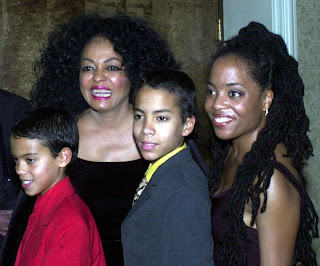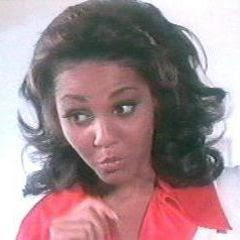
The King lives!

On June 25, 2010, will be the one year anniversary since the world lost the most famous Icon/legend to have ever dawned a stage, screen, magazine cover, award show, and once again, The king of pop, Michael Jackson has broke another record.
It sounds strange to say this, but Michael Jackson is coming off one of the biggest years of his career. Jackson has sold more than 9 million albums and nearly 13 million digital tracks in the U.S. in the year since his death. He was hotter than he'd been at any time since his glory days in the ‘80s. He even achieved a career goal that had eluded him in his lifetime--a hit movie. .

I think what happened in the past year is that people focused on Jackson's music for the first time in many years, and remembered how much they liked it. Sadly, it took Jackson's death for people to look past all the controversies--large and small, troubling and trivial--that turned a lot of people off..

In the year since he died, Jackson has sold 9,023,000 albums in the U.S. This has enabled him to vault from #47 on Nielsen/SoundScan's running list of the top 200 album sellers in its history (which dates to 1991) to #18 this week. That's a tremendous one-year gain..
Jackson's posthumous sales are among the most impressive in the history of the music business. Nielsen/SoundScan didn't exist when Elvis Presley died in 1977 or when John Lennon was killed in 1980, so precise comparisons aren't possible, but the Billboard charts shed some light on the matter..

With his smash compilation Number Ones, Jackson became only the 13th artist to have the best-selling album in the U.S. posthumously. And with the subsequent soundtrack to Michael Jackson's This Is It, he became one of only five artists to have the best-selling album in the U.S. with two albums after his death. Bandleader Glenn Miller and rappers 2Pac and The Notorious B.I.G. each had three posthumous #1 albums. Nirvana, featuring the late Kurt Cobain, had two..
Eight other artists had one posthumous #1 album: Presley and Lennon are joined on this list by Janis Joplin, Jim Croce, Selena, Aaliyah, Johnny Cash and Ray Charles..
Jackson long wanted to be a movie star, a sort of modern-day Fred Astaire. In death, he got at least part of his wish: a #1 box-office hit. Michael Jackson's This Is It topped the box-office in its opening weekend at the end of October with a domestic gross of more than $23 million..
The soundtrack album entered The Billboard 200 at #1 that same week, with first-week sales of 373,000. (It was eligible for that chart because it was a new compilation.)

That made Jackson only the sixth music star since the early ‘80s to star in a movie that came in #1 at the box-office and also spawned a #1 soundtrack (on which the star was featured). He followed Prince (1984's Purple Rain); Whitney Houston (1995's Waiting To Exhale); Will Smith (1997's Men In Black); Eminem (2002's 8 Mile); and Miley Cyrus (2009's Hannah Montana: The Movie)..
Michael Jackson's This Is It grossed more than $72 million in the U.S., which made it the top-grossing music concert film in history. (The old record was held by Hannah Montana/Miley Cyrus' 2008 movie Best Of Both Worlds Concert Tour, which grossed more than $65 million.) The movie grossed an additional $180 million in foreign markets for a combined worldwide gross of $252 million. It was also a hit on DVD, with U.S. DVD sales estimated at $43 million..
Beyond the box-office success, the movie helped Jackson's image because it showed him in action and in charge. And we haven't seen that side of him since his heyday. Since Bad came out in 1987, he was usually on the defensive, facing slipping sales, image problems, criminal charges, and all the rest. His life spun out of control. Here, he was seen as being in control again..
In the weeks following his death on June 25, Jackson toppled records that had stood for decades. In the week after he died, he had the three best-selling albums in the U.S.: Number Ones, The Essential Michael Jackson, and Thriller. Since 1963, when Billboard combined its separate stereo and mono charts into one comprehensive listing, no other act had accomplished that feat. (The Beatles came closest, nailing down three of the top four spots in May 1964.).
For two weeks in July, Jackson had six of the 10 best-selling albums in the U.S. This broke a record that had stood since April 1966, when Herb Alpert & the Tijuana Brass had four of the top 10.

As I noted last summer, this has a strong sense of déjà vu for me. I wrote a column for Billboard in 1983 and 1984, when Jackson was setting new records virtually every week. I never imagined that it would all happen again, and certainly not under these sad circumstances..
In the week after he died, Jackson became the first artist to sell more than 1 million digital tracks in one week. (He sold 2.6 million, obliterating the old record.) Combining solo hits with songs he recorded with his brothers, he had a staggering 49 of the top 200 titles on the Hot Digital Songs chart that week. He held down six of the top 10 spots..
In each of the first seven weeks after he died, Jackson had three of the five best-selling albums in the U.S.: His biggest seller throughout this period was Number Ones. The hit-studded collection sold more copies in the first 16 weeks after Jackson's death than it had in the five and half years between its release in November 2003 and his death. At its peak in July, Number Ones sold 349,000 copies in one week. That constituted the biggest one-week sales tally for a non-holiday catalog album in Nielsen/SoundScan history..
Number Ones logged six weeks as the best-selling album in the U.S. That was the longest that an artist who had died had the nation's top-seller since 1980-1981, when Double Fantasy, by John Lennon and his widow, Yoko Ono, topped The Billboard 200 for eight weeks. It was the longest that a greatest hits set was the best-selling album in the U.S. since 2000-2001, when the Beatles' 1 held the top spot for eight weeks. It was the longest that Jackson had the top-seller since 1987, when Bad held the top spot for six weeks..
Jackson's phenomenal posthumous success forced Billboard to change its long-time policy of excluding catalog albums from The Billboard 200. Beginning with the chart for the issue dated Dec. 5, 2009, catalog albums were able to compete alongside current product on the magazine's flagship chart. The move came too late for Jackson's albums to take their rightful places in the top 10, but it was welcome development nonetheless..
When Nielsen/SoundScan released its final sales tallies for 2009, Jackson had four of the year's top 20 albums: Number Ones at #3, Michael Jackson's This Is It at #12, Thriller at #14 and The Essential Michael Jackson at #20. This constituted a record for the SoundScan era. The old record was held by Garth Brooks, who had three of the top 20 albums of 1992. (In Brooks's case, however, all three made the year-end top 10.).
By coming in at #3 for the year, Number Ones ranked higher on Nielsen/SoundScan's year-end chart than any album ever had following the artist's death. 2Pac's All Eyez On Me was the #6 album of 1996. The Notorious B.I.G.'s Life After Death was the #6 album of 1997..
Number Ones sold 2,355,000 copies in the U.S. in 2009. It sold all but 117,000 of those copies after Jackson's death..
Jackson had seven of Nielsen/SoundScan's top 100 albums of 2009. In addition to his four albums that made the year-end top 20, Off The Wall was #66, Bad was #68 and Dangerous was #98..
Jackson had nine of the top 200 digital songs of 2009. His biggest hit was "Thriller," which sold 1,096,000 copies during the calendar year. His other top-selling songs for the year were, in descending order: "Billie Jean" (938,000), "Man In The Mirror" (890,000), "Beat It" (830,000), "The Way You Make Me Feel" (671,000), "Don't Stop ‘Til You Get Enough" (611,000), "Smooth Criminal" (605,000), "P.Y.T. (Pretty Young Thing)" (557,000), and "Black Or White" (511,000).

Since the digital era began, the song "Thriller" has sold 2,362,000 digital copies. Only one song from the ‘80s has outsold it. That's Journey's ubiquitous 1981 smash "Don't Stop Believin'," which has sold 3,819,000 copies. But Jackson tops the arena rock band in one respect: He has a second song on Nielsen/SoundScan's running list of the 200 best-selling digital songs in its history. "Billie Jean" has sold 1,898,000 copies in the digital era..
Thriller is closing in on Dangerous as Jackson's best-selling album of the Nielsen/SoundScan era. Thriller has sold 5,816,000 copies since 1991. Dangerous has sold 6,363,000 (combining two editions of the album). This is remarkable because Thriller was released more than eight years before the start of the Nielsen/SoundScan era. By contrast, all Dangerous sales are contained in the SoundScan era..
Jackson topped charts all over the world after his death. Number Ones and The Essential Michael Jackson both reached #1 in the U.K. The latter album topped the U.K. chart for seven weeks, which was the longest run for an American artist since Justin Timberlake's Justified stayed on top for seven weeks in 2003..
Jackson also had a pair of #1 albums in Japan: King Of Pop (Japan Edition) and Michael Jackson's This Is It!

PDT by Paul Grein







































